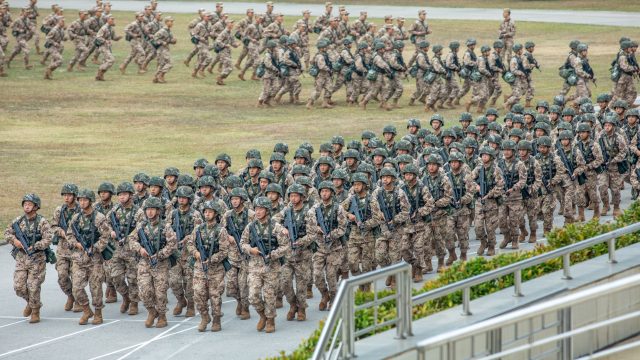
China is boosting its defense budget. It is ratcheting up its rhetoric against Taiwan. And also: It is trying to get its economy growing again. The country will boost its military spending by 7.2% this year, Reuters said, “fueling a military budget that has more than doubled under President Xi Jinping’s 11 years in office.” The announcement came at the National People’s Congress, a “rubber-stamp parliament” that also officially adopted new language that drops any mention of “peaceful reunification” with Taiwan. All of this comes amid an entrenched economic slump: The rise in defense spending “comes in well above the government’s economic growth forecast for this year,” which has been targeted at 5%.
“Few things — not even a budget deficit of 3% of gross domestic product — will stand in the way of Beijing increasing defense spending,” said the Financial Times. China’s military budget has more than doubled under President Xi Jinping (though it still trails American defense spending) and that increase has been “matched by a growing number of regional disputes.” But Xi has pledged to give his country a “world-class force” by 2027, and that means the military “will grow regardless of the economic health of China.”
That health is shaky, CNN said. China’s economy has been battered by “a troubled property sector, deflationary pressures, an exodus of foreign capital, a battered stock market and a record low birth rate.” Hitting the 5% target, said one expert, is “ambitious but achievable.”
‘Gearing up for war’
The continued military spending — along with the change of rhetoric — suggests that Beijing is “gearing up for war,” said Business Insider. China hasn’t always used the word “peaceful” to describe its goal of reunification with Taiwan, but it’s clear the country’s leaders are now intent on “taking a tougher approach” to the island. The defense budget shows that leadership “wants to grow its military to the point where it is prepared to win a war if it has no choice but to fight one,” said one expert.
Other observers are playing down the increase, saying it reflects a focus on “military readiness, not imminent war,” said the South China Morning Post. “The cost of high-tech equipment is rising and the increase in military spending is normal to adapt to the advancements in military equipment,” said a “former equipment expert” for the People’s Liberation Army. That doesn’t mean war is on the horizon. “The current situations in the Taiwan Strait and South China Sea are controllable and preventable,” said Yue Gang, a retired PLA colonel.
“Alarms should be ringing” in Taiwan and the United States, defense analyst Ben Lewis said in The New York Times. China’s military has ratcheted up provocative air and naval activity around Taiwan in recent years, raising the “risk of an accidental confrontation.” Increased military spending only makes that confrontation more likely, Michael Beckley and Hal Brands said at Foreign Policy. “One reason China has become more combative is because it can.”
No ‘policy bazooka’
Sustaining that increased spending on the armed forces will be a lot easier, though, if the Chinese economy grows along with it. That’s not a sure thing. The New York Times said that while officials have set that “ambitious” economic growth target of 5%, they offered no “showstopping moves” to get there. “Anybody who is looking for the policy bazooka is going to be disappointed,” said one expert. The focus, it seems, is on actual bazookas.
That’s because Xi is giving “priority to strategic autonomy over economic growth,” said The Wall Street Journal. Building the military is more important than building the economy. Why? It’s all about power. Said one expert: “Xi clearly believes that a stringent focus on security can fend off any threats to his power stemming from China’s current economic challenges.” The next year could determine if he’s right.
Leaders want to grow the military faster than the economy




